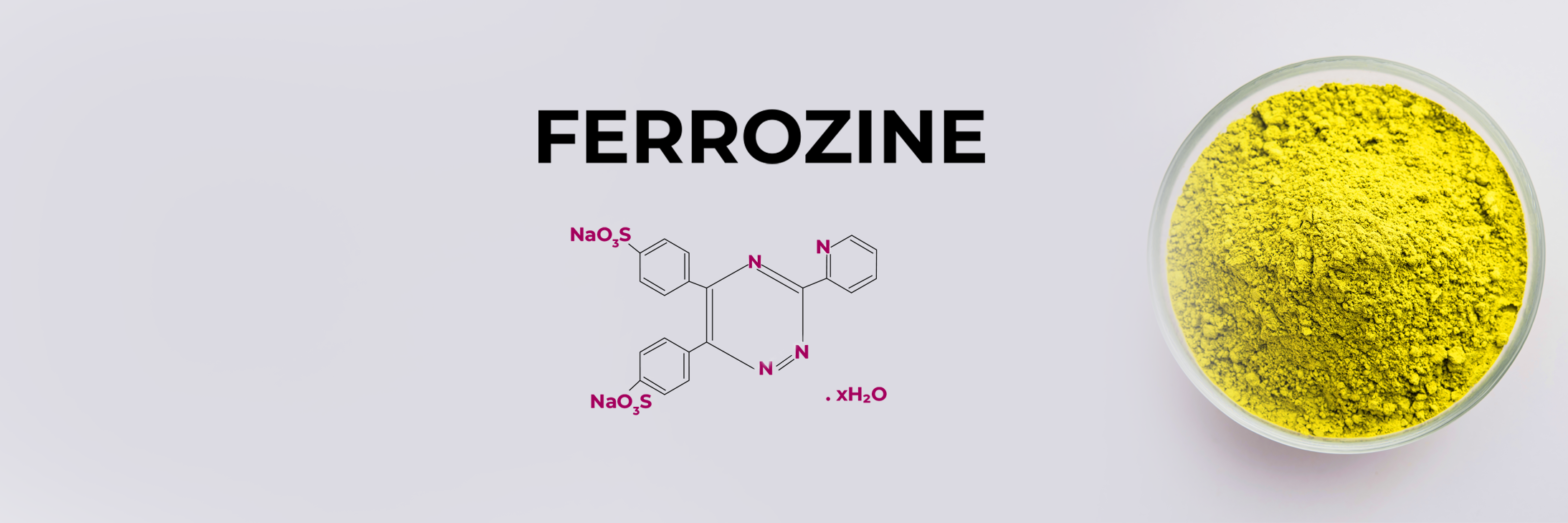INTRODUCTION
Ferrozine, chemically 3-(2-Pyridyl)-5,6-bis(4-phenylsulfonic acid)-1,2,4-triazine disodium salt, is a water-soluble solid. It is complexometric reagent for detection and estimation of iron.
Manufacture
It is synthesized by condensation of 2,6-dimethyl pyridine with 3,5-dinitrobenzenesulfonic acid, followed by reduction with Fe powder, and then sulfonation with fuming sulfuric acid. Purification occurs via crystallization from water.
| Synonym | 3-(2-Pyridyl)-5,6-diphenyl-1,2,4-triazine-4´,4´´-disulfonic acid sodium salt |
| CAS no. | 28048-33-1 |
| EINECS no. | 248-797-6 |
| Molecular formula | C20H12-13N4Na1-2O6S2·xH2O |
| Molecular weight | 468.47 (anion) |
| Structure |  |
| Applications |
|---|
| Determine the iron content in food, water, chemicals, and biological samples |
| Study the metabolism of iron in cells and tissues |
| Monitor the environmental pollution caused by heavy metals |
| Preparation of iron complexes for catalysis |
| Synthesis of iron nanoparticles for biomedicine |
| Develop new sensors, biomaterials, and drug delivery systems |
| Improve efficacy and safety of existing medicinal treatments |
| Numerous other applications in scientific experiments, especially in the fields of analytical chemistry, biochemistry, and environmental science |
SPECIFICATIONS
| Test | Unit | Specification |
|---|---|---|
| Appearance | – | Greenish yellow powder |
| Solubility (C5%; w/v. in acetate buffer, pH 5.5) | – | Yellow, clear |
| Identification by UV (c = 1%, w/v, d = 1 cm) | – | Should correspond to standard Max 282-284 nm Specific Extinction at absorption Max 385-465 |
| Identification by IR | – | Should correspond to standard |
| Sodium by flame photometry, based on hydrous substance | % | 4.0 – 9.0 |
| KF Water | % | ≤10.0 |
| Assay Ferrozine anion (Photometric), based on hydrous substance | % | 90.0 – 110.0 |
STORAGE
Stored at ambient temperature.
PACKING
25 kg drum.
REACH Status
Not registered yet.
No matter the quantity you need, our exceptional quality and service will make ExSyn your supplier of choice! If you need any additional information or SDS, please contact us.
Iodine is anon-metallic, dark-grey/purple-black, lustrous, solid element. It is the heaviest and the rarest of stable halogens that can be found on the crust of earth.About fifty percent of all iodine produced and manufactured worldwide is used to form Organoiodine compounds. Iodine is an important element for many health-sustaining processes and essential for human thyroid health.
The product, acronymed Oct-NBE, is an organic compound with a cyclic ring system and a 8-membered hydrophobic chain. The structure renders the chemical special properties leading to its applications in diverse fields.
Nicotine is a hygroscopic, colorless to slight yellow, oily liquid, that is readily soluble in alcohol, ether or light petroleum. It is widely used recreationally as a stimulant and anxiolytic.
The product, acronymed ETD, is an organic compound with a fused bicyclic ring system and an ethylidene group. The structure renders the chemical special properties leading to its applications in diverse fields.
Sodium perchlorate monohydrate is the inorganic compound with the chemical formula NaClO4•H2O. It is the common existence form of sodium perchlorate, which can gradually absorb water in the air to form the monohydrate. Sodium perchlorate monohydrate is white rhombic crystal which is highly soluble in water and in alcohol. Its capacity to undergo redox reactions, liberating oxygen atoms, has been harnessed in the preparation of specialty chemicals, including pharmaceutical intermediates and fine chemicals.
Triphenylphosphine is a common organophosphorus compound that is frequently abbreviated as PPh3 or Ph3P. It is widely used in organic and organometallic compound synthesis because it is an effective reducing agent as well as a neutral ligand. At room temperature, PPh3 crystals are relatively air-stable and colourless.
Potassium chlorate holds significant importance across various industries due to its diverse applications. This white crystalline compound has been utilized for centuries as an essential ingredient in the production of matches, fireworks, and explosives, owing to its ability to release oxygen upon decomposition.
Podophyllotoxin is a non-alkaloid toxin lignan extracted from the roots and rhizomes of Podophyllum species. It is an organic heterotetracyclic compound that has a Furonaphthodioxole skeleton bearing a 3,4,5-trimethoxyphenyl substituent.
Octadecylphosphonic acid (ODPA), a versatile chemical compound, serves as a surfactant and dispersant in applications spanning coatings, lubricants, and corrosion inhibition. With its hydrophobic octadecyl chain linked to a phosphonic acid group, it excels in surface modification, boosting adhesion in metal surfaces.
